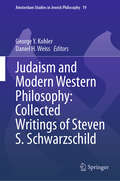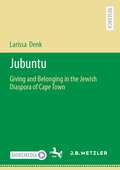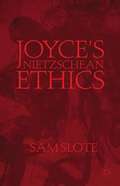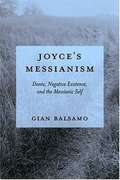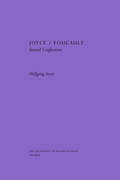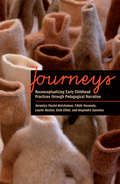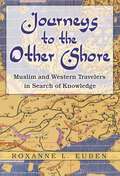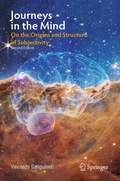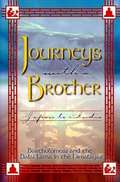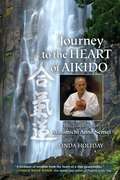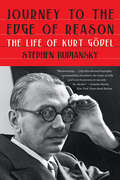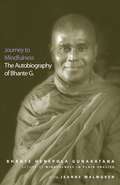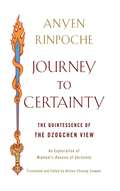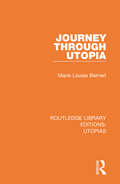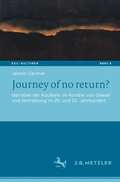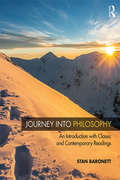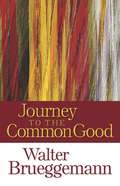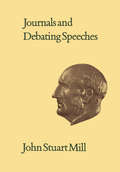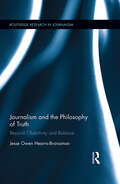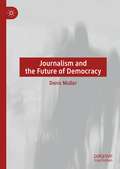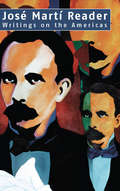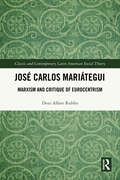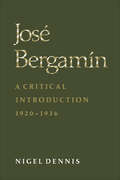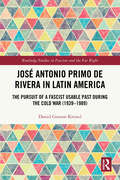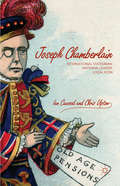- Table View
- List View
Judaism and Modern Western Philosophy: Collected Writings of Steven S. Schwarzschild (Amsterdam Studies in Jewish Philosophy #19)
by Steven S. SchwarzschildWhat are the implications of Franz Rosenzweig's quasi-racialist commonalities with Heidegger's thought? Was Kant a 'Jewish thinker'? Does Spinoza's philosophy lend support to totalitarianism? Was Marx's philosophy more shaped by Jewish cultural tradition than is typically assumed? Was there a strong challenge to Strauss's reading of Maimonides already in the 1940s? This volume contains a collection of Steven S. Schwarzschild's (1924-1989) most important unpublished works, the majority of which were found in his literary remains. The essays present provocative perspectives on influential philosophical figures such as Maimonides, Spinoza, Kant, Hegel, Marx, Rosenzweig, Heidegger, and Leo Strauss. As one of the most original twentieth-century thinkers in the field of Jewish philosophy, Schwarzschild's analysis provides readers with new ways of understanding modern Western philosophy, Jewish religious tradition, and the relation between them.
Jubuntu: Giving and Belonging in the Jewish Diaspora of Cape Town
by Larissa DenkThis study investigates the nexus between giving, belonging and Jewishness in South Africa. Charitable interactions are as much manifestations of inequalities as an expression of the giving individual’s desire to alleviate them. Structuring aspects like class, race, economics, and post-apartheid politics are at the basis of this study. At the same time, though, it is individual agency reproducing inequalities and making sense of the ambiguity of the charitable interaction. In the context of the Jewish community in South Africa this analysis shows how the community’s organisations, practices and concepts are connected to charitable giving. The author carved out three dimensions, which are entangled, reinforced, or at times contradict each other: Belonging, diaspora and charitable giving. Along with shared values and practices it relates to, volunteering or charitable giving connects one individual to a group, while possibly excluding another from it. Expressing belonging to the Jewish collective as a diaspora community, relates individuals or collectives to the triadic relationship between local diaspora group, host society and homeland and other local communities of the same diaspora.
Joyce’s Nietzschean Ethics
by Sam SloteThe first book-length treatment of James Joyce's work through the lens of Friedrich Nietzsche's thought, Slote argues that the range of styles Joyce deploys has an ethical dimension. This intersection raises questions of epistemology, aesthetics, and the construction of the 'Modern' and will appeal to literary and philosophy scholars.
Joyce's Messianism: Dante, Negative Existence, and the Messianic Self
by Gian BalsamoIn his study of negative existence and how it affects James Joyce's principal characters, Gian Balsamo joins the ongoing debate about the Irish writer's relationship to Dante and considers the centrality of messianism to that relationship. Finding in Dante a negative poetics that becomes a model for Joyce, Balsamo suggests that the inception and cessation of life - two occurrences that conventionally are deemed impossible to experience personally and directly - typically frame the existential experiences of Joyce's main characters. Balsamo perceives Stephen, Leopold, and Shem as messianic figures because they rebel against this convention, clustering their lives around the very events of inception and burial. Balsamo traces the engagement of each of the three characters in a negative existence immune from the rules and limitations of ordinary experience. Each struggles to express rather than exorcise the fecundity of his own mortality; each reinvents his biography as involving the pivotal transaction of one death - be it a mother's, a son's, or even that of his own body - in return for catharsis. Durkheim, and Noam Chomsky, Balsamo challenges the current debate by identifying the messianic thread that ties together the biographies of Joyce's three characters. Faced with the fissure between history and poetic vocation, Stephen embraces the sacrificial poetry of silence. Faced with the domestic squalor provoked by the loss of his son, Leopold renews at every meal the cathartic exchange of food and semen. Faced with a destiny of death and decomposition, Shem reenacts the tradition of the medieval cycle drama, stretching his own body like a parchment on a cross and then rubricating it like a sacred manuscript.
Joyce / Foucault
by Wolfgang StreitSheds new light on James Joyce's use of sexual motifs as cultural raw material for Ulysses and other works Joyce/Foucault: Sexual Confessions examines instances of sexual confession in works of James Joyce, with a special emphasis on Portrait of the Artist as a Young Man and Ulysses. Using Michel Foucault's historical analysis of Western sexuality as its theoretical underpinning, the book foregrounds the role of the Jesuit order in the spread of a confessional force, and finds this influence inscribed into Joyce's major texts. Wolfgang Streit goes on to argue that the tension between the texts' erotic passages and Joyce's criticism of even his own sexual writing energizes Joyce's narratives-and enables Joyce to develop the radical skepticism of power revealed in his work.
Journeys: Reconceptualizing Early Childhood Practices Through Pedagogical Narration
by Veronica Pacini-Ketchabaw Fikile Nxumalo Laurie Kocher Enid Elliot Alejandra SanchezInspired by the idea of documentation as a valuable tool for making learning visible, pedagogical narration offers an opportunity to move beyond checklists and quick answers to a more complex understanding of how children learn, and how teachers might facilitate and support that learning in innovative ways. The authors use stories they collected during a collaborative study to offer a range of possibilities for alternative childhood pedagogies. Cutting edge, yet practical; detailed in its analysis, yet inspiring, this book is a boon to the field of early childhood and primary education studies.
Journeys to the Other Shore: Muslim and Western Travelers in Search of Knowledge (Princeton Studies in Muslim Politics #23)
by Roxanne L. EubenThe contemporary world is increasingly defined by dizzying flows of people and ideas. But while Western travel is associated with a pioneering spirit of discovery, the dominant image of Muslim mobility is the jihadi who travels not to learn but to destroy. Journeys to the Other Shore challenges these stereotypes by charting the common ways in which Muslim and Western travelers negotiate the dislocation of travel to unfamiliar and strange worlds. In Roxanne Euben's groundbreaking excursion across cultures, geography, history, genre, and genders, travel signifies not only a physical movement across lands and cultures, but also an imaginative journey in which wonder about those who live differently makes it possible to see the world differently. In the book we meet not only Herodotus but also Ibn Battuta, the fourteenth-century Moroccan traveler. Tocqueville's journeys are set against a five-year sojourn in nineteenth-century Paris by the Egyptian writer and translator Rifa'a Rafi' al-Tahtawi, and Montesquieu's novel Persian Letters meets with the memoir of an East African princess, Sayyida Salme. This extraordinary book shows that curiosity about the unknown, the quest to understand foreign cultures, critical distance from one's own world, and the desire to remake the foreign into the familiar are not the monopoly of any single civilization or epoch. Euben demonstrates that the fluidity of identities, cultures, and borders associated with our postcolonial, globalized world has a long history--one shaped not only by Western power but also by an Islamic ethos of travel in search of knowledge.
Journeys in the Mind: On the Origins and Structure of Subjectivity
by Vincenzo SanguinetiThis book presents a systematic exploration of the subjective experience, keeping the investigation for the most part within a subjective first person perspective through the use of “vignettes” as sources of data. It also uses incorporates a ‘"third person” objective approach when that is relevant. The goal of Journeys in the Mind is to capture and convey the operations of the mind: both the shared blueprints common to the elaboration of subjective knowledge as well as the immense fishnet of personalized variables that operate in each mental phase-space and act upon the blueprints to continuously recategorize them into sets of coherent, dynamic outcomes, or mental landscapes. Dr. Sanguineti's meditative perspective holds the promise to enrich the way we understand the workings of the human mind.
Journeys With A Brother: Japan To India
by Dalai Lama Xiv BartholomewFans of Bartholomew will enjoy his latest travels detailed in this book.
Journey to the Heart of Aikido: The Teachings of Motomichi Anno Sensei
by Linda Holiday Motomichi AnnoJourney to the Heart of Aikido presents the teachings of Motomichi Anno Sensei, one of the few remaining direct students of Morihei Ueshiba, the legendary founder of Aikido. After a lifetime of practice and teaching in Japan, the United States, and Europe, Anno Sensei conveys through his teachings Aikido's essential spirit of love, harmony, gratitude, and purification with simple authenticity and eloquence. Author and translator Linda Holiday--herself a senior instructor of Aikido--brings to life the intimacy of this communication through translated discourses on the deep practice of Aikido and candid dialogues between Anno sensei and Western students. Journey to the Heart of Aikido includes Linda Holiday's vivid account of her adventure as a young woman studying Aikido in the mystical region of Kumano, Japan, in the 1970s, and a poignant telling of Anno sensei's life and his first-hand experience of training with Aikido's founder. An essential resource for the global Aikido community, Journey to the Heart of Aikido also offers spiritual teachings relevant to all contemporary seekers, touching a wide range of themes such as the meaning of martial arts, the integration of body and spirit, the truth of interconnectedness, and the practice of peace, offering all readers insight into the profound spiritual questions at the heart of life.From the Trade Paperback edition.
Journey to the Edge of Reason: The Life Of Kurt Gödel
by Stephen BudianskyThe first major biography of the logician and mathematician whose Incompleteness Theorems helped launch a modern scientific revolution. Nearly a hundred years after its publication, Kurt Gödel’s famous proof that every mathematical system must contain propositions that are true—yet never provable—continues to unsettle mathematics, philosophy, and computer science. Yet unlike Einstein, with whom he formed a warm and abiding friendship, Gödel has long escaped all but the most casual scrutiny of his life. Stephen Budiansky’s Journey to the Edge of Reason is the first biography to fully draw upon Gödel’s voluminous letters and writings—including a never-before-transcribed shorthand diary of his most intimate thoughts—to explore Gödel’s profound intellectual friendships, his moving relationship with his mother, his troubled yet devoted marriage, and the debilitating bouts of paranoia that ultimately took his life. It also offers an intimate portrait of the scientific and intellectual circles in prewar Vienna, a haunting account of Gödel’s and Jewish intellectuals’ flight from Austria and Germany at the start of the Second World War, and a vivid re-creation of the early days of Princeton’s Institute for Advanced Study, where Gödel and Einstein both worked. Eloquent and insightful, Journey to the Edge of Reason is a fully realized portrait of the odd, brilliant, and tormented man who has been called the greatest logician since Aristotle, and illuminates the far-reaching implications of Gödel’s revolutionary ideas for philosophy, mathematics, artificial intelligence, and man’s place in the cosmos.
Journey to Mindfulness
by Bhante Henepola Gunaratana Jeanne MalmgrenBhante Gunaratana - Bhante G., as he is affectionately called - has long been among the most beloved Buddhist teachers in the West. Ordained at twelve, he would eventually become the first Buddhist chaplain at an American university, the founder of a retreat center and monastery, and a bestselling author. Here, Bhante G. lays bare the often-surprising ups and downs of his seventy-five years, from his boyhood in Sri Lanka to his decades of sharing the insights of the Buddha, telling his story with the "plain-English" approach for which he is so renowned.
Journey to Certainty
by Anyen Rinpoche Allison Choying ZangmoApproachable yet sophisticated, this book takes the reader on a gently guided tour of one of the most important texts Tibetan Buddhism has to offer. "Certainty" in this context refers to the unshakeable trust that develops as meditators discover for themselves the true root of reality. In this authoritative presentation, master teacher Anyen Rinpoche opens wide the storehouse of this richly philosophical text in a way that lets readers of all backgrounds easily benefit.
Journey through Utopia: A Critical Examination Of Imagined Worlds In Western Literature (Routledge Library Editions: Utopias)
by Marie Louise BerneriIn this title, originally published in 1950, the author has set out to give a description and a critical assessment of the most important (not necessarily the most famous) Utopian writings since Plato first gave, in his Republic, a literary form to the dreams of a Golden Age and of ideal societies which had doubtless been haunting man since the beginning of the conscious discussion of social problems. It is more than a mere compilation and criticism of Utopias, it brings out in a striking way the close and fateful relationship between Utopian thought and social reality, and takes its place among the important books which had appeared in the previous few years, warning us, from various points of view, of the doom that awaits those who are foolish enough to put their trust in an ordered and regimented world.
Journey of no return?: Narrative der Rückkehr im Kontext von Gewalt und Vertreibung im 20. und 21. Jahrhundert (Exil-Kulturen #6)
by Jasmin CentnerDiese literaturwissenschaftliche Studie beschäftigt sich mit Rückkehrerzählungen, denen eine gewaltvolle Vertreibung vorausliegt. Erfahrungen der erzwungenen Entortung und der anschließenden Rückkehr prägen nicht nur die Handlung von Texten, sondern wirken sich auch auf die Ästhetik der Narrationen aus. Die acht untersuchten Erzähltexte (u.a. von Anna Seghers, Abbas Khider, Peter Weiss, Primo Levi, Herta Müller und Doron Rabinovici) befragen (Un-)Möglichkeiten der Rückkehr aus unterschiedlichen Perspektiven. Texte, die vor dem Hintergrund der nationalsozialistischen Vertreibungspolitik entstanden sind, werden mit aktuellen Erzählungen in Verbindung gesetzt. In vier thematischen Sektionen (u.a. Rückkehr aus dem Exil, aus dem Lager sowie nach Palästina/Israel) wird gezeigt, dass die Rückkehr in unterschiedlichen Kontexten ähnliche Erzählmuster hervorbringt sowie Vorstellungen von Heimat und Ursprünglichkeit problematisiert
Journey into Philosophy: An Introduction with Classic and Contemporary Readings
by Stan BaronettThe overriding rationale behind this book is a desire to enrich the lives of college students by introducing them to the practice of philosophical thought in an accessible and engaging manner. The text has over one hundred classical and contemporary readings that facilitate studying each philosophical issue from a variety of perspectives, giving instructors the opportunity to choose a set of readings that matches the individual needs of each class. It includes many selections by philosophers whose works are often ignored or underrepresented in other introductory texts. The initial reading, "The Role of Philosophy," is a relevant, clear, and absorbing introduction to the discipline of philosophy. It uses everyday life situations to give students a solid foothold before they journey into specific philosophical topics. In addition, every section of the book has its own special introduction that connects each topic to students’ personal lives. The surrounding narrative is designed to be conversational and comprehensible. Special features include a section on the role of logic, and writing a philosophy paper, two useful tools for approaching and analyzing philosophical writing for students who are new to philosophy. The book is accompanied by a companion website (www.routledge.com/cw/Baronett), with many helpful features, including (for students) review questions for all readings in the book, videos, and 66 related entries taken from the student-friendly Routledge Encyclopedia of Philosophy and (for instructors) 2,500 questions and answers."
Journey To The Common Good
by Walter BrueggemannRespected author and theologian Walter Brueggemann turns his discerning eye to the most critical yet basic needs of a world adapting to a new era, an era defined in large part by America's efforts to rebuild from an age of terror even as it navigates its way through an economic collapse. Yet in spite of these great challenges, Brueggemann calls us to journey together to the common good through neighborliness, covenanting, and reconstruction. Such a concept may seem overwhelming, but writing with his usual theological acumen and social awareness Brueggemann distills this challenge to its most basic issues: where is the church going? What is its role in contemporary society? What lessons does it have to offer a world enmeshed in such turbulent times? The answer is the same answer God gave to the Israelites thousands of years ago: love your neighbor and work for the common good. Brueggemann considers biblical texts as examples of the journey now required of the faithful if they wish to move from isolation and distrust to a practice of neighborliness, as an invitation to a radical choice for life or for death, and as a reliable script for overcoming contemporary problems of loss and restoration in a failed urban economy.
Journals and Debating Speeches: Volumes XXVI-XXVII
by John Stuart Mill John RobsonOne of the constant fascinations Mill holds for the general public as well as scholars derives from the early flowering of his genius. This development is seen in detail in the journal and notebook he kept in France during his fifteenth year, and in the debating speeches and walking-tour journals dating from his eighteenth to twenty-fourth years. This was the period when he first adopted Benthamism as 'a religion,' worked intensively as a propagandist for the faith, and then began the painful reassessment that led to his independent mature thought and action. Some of the results of that reassessment are seen in the diary entries from 1854, written for his wife, which reveal in personal form many of their most passionately held ideas. These materials have never before been gathered, and almost all appear here for the first time in scholarly form. They throw light on contemporary social interests and behavior, and will encourage new assessments of Mill’s life and thought. The texts, the great majority drawn from manuscripts, are presented in critical form, collated, with explanatory and textual notes. The Introduction gives the personal and historical context, with an analysis of content and rhetoric; the Textual Introduction supplies information about the nature and history of the documents, while Appendices provide ancillary materials. Both bibliographic and analytic indexes are included.
Journalism and the Philosophy of Truth: Beyond Objectivity and Balance (Routledge Research in Journalism)
by Jesse Owen Hearns-BranamanThis book bridges a gap between discussions about truth, human understanding, and epistemology in philosophical circles, and debates about objectivity, bias, and truth in journalism. It examines four major philosophical theories in easy to understand terms while maintaining a critical insight which is fundamental to the contemporary study of journalism. The book aims to move forward the discussion of truth in the news media by dissecting commonly used concepts such as bias, objectivity, balance, fairness, in a philosophically-grounded way, drawing on in depth interviews with journalists to explore how journalists talk about truth.
Journalism and the Future of Democracy
by Denis MullerThis book is about how journalism can contribute to the recovery of democracy from the crisis exemplified by the Trump presidency, the Brexit referendum and the rise of populism across the Western world. It explores the ethical concepts that provide the foundation for journalism in modern democracies: pluralism, liberalism, tolerance, truth, free speech, and impartiality. History has shown that crisis brings opportunity for change on a scale that is unachievable under ordinary political conditions, and this book proposes fundamental ways in which journalism can help democratic societies seize the moment. It traces the development of traditional mass media and social media and explores how the two might work better together to benefit democratic life. The development of press theory is described, and enhanced by a proposed new theory, Democratic Revival.
José Martí Reader: Writings on the Americas
by José Martí Ivan A. Schulman<P>This new edition of an elegant anthology features bilingual poetry, a revised translation, and several new pieces. It presents the full breadth of José Martí's work: his political essays and writings on culture, his letters, and his poetry. Readers will discover a literary genius and an insightful political commentator on troubled US-Latin America relations. <P>"[Martí] added a social agenda to the historic program of national liberation and instantly converted a movement devoted to the establishment of a new nation into a force dedicated to shaping a new society. Martí transformed rebellion into revolution. . . . Like a master weaver, Martí pulled together all the separate threads of Cuban discontent--social, economic, political, racial, historical--and wove them into a radical movement of enormous force."--Louis A. Pérez Jr, author of José Martí in the United States <P>"Oh Cuba! . . . the blood of Martí was not yours alone; it belonged to an entire race, to an entire continent; it belonged to the powerful youth who have lost probably the best of teachers; he belonged to the future!"--Rubén Darío
José Carlos Mariátegui: Marxism and Critique of Eurocentrism (Classic and Contemporary Latin American Social Theory)
by Deni Alfaro RubboThis volume explores the life, work, and impact of the Peruvian thinker José Carlos Mariátegui (1894–1930), particularly his political biography, his intellectual production, and his critique of Eurocentrism.This posthumous fame is based on the idea that, in the whole of his political-theoretical project, the relationship between Latin America and Marxism was not built using a mechanical linking of effects and causes, of the blatant copy of the theory produced in Europe, of the immediate application of positivist formulas. In this complex relationship, enigmatic and insinuating, a dissonant historical temporality emerged in Latin America. The apparently unbalanced temporalities marked the matrix of capitalist exploitation, but also present, in Mariátegui’s view, glimmers of future possibilities.This book is essential reading for scholars of social sciences and history interested in understanding the historical roots and political dilemmas of Latin American and European societies from the unique perspective of one of the greatest thinkers of the twentieth century.
José Bergamín: A Critical Introduction, 1920-1936
by Nigel DennisWriter, critic, and cultural activist José Bergamín (1895-1983) was unjustly relegated to the sidelines of contemporary Spanish intellectual life for reasons that have more to do with his political dissidence and long periods of exile than with the interest and importance of his written work. This book represents the first attempt to come to terms with that work. Professor Dennis's study focuses on the period 1920-1936, the so-called silver age of Spanish literature, during which Bergamín rose to prominence alongside a group of superlatively gifted writers and friends, among them Frederico Garcia Lorca, Rafael Alberti, Jorge Guillén, and Pedro Salinas. It sets out to explain the nature of the relationship Bergamín had as a critic and prose writer with the major poets of the 1920s and 1930s, and at the same time systematically examines the singularity of his own work as an aphorist, essayist, and dramatist. Professor Dennis also devotes attention to explaining the sense of Bergamín's initiative in founding the important journal Cruz y Raya (1933-1936) and the role this publication played, both culturally and politically, during the troubled years of the Second Republic. This book not only fills a notable gap in our understanding of pre--Civil War literary and intellectual life in Spain, but also lays the foundation for all future research into the work of this fascinating and enigmatic writer.
José Antonio Primo de Rivera in Latin America: The Pursuit of a Fascist Usable Past during the Cold War (1939–1989) (Routledge Studies in Fascism and the Far Right)
by Daniel Gunnar KresselThis book explores a distinctive neo-fascist movement that emerged in Latin America and Spain during the Cold War. At times self-labeled “Jose Antonians,” the book’s protagonists evoked the memory and ideology of José Antonio Primo de Rivera. The author first elucidates who this Spanish fascist was and why his memory loomed large among Latin American rightists. Second, the book explores how, by prompting political violence and jeopardizing democratization processes, these neo-fascist ideologues impacted their respective societies. In doing so, the book initiates a much-needed debate on fascist memory in the Cold War.This concise monograph will be of interest to researchers of transnational fascism, the Cold War, and Spanish and Latin American history.
Joseph Chamberlain: International Statesman, National Leader, Local Icon
by I. Cawood C. UptonWinston Churchill described Joseph Chamberlain as 'the man who made the weather' for twenty years in British politics between the 1880s and the 1900s. This volume contains contributions on every aspect of Chamberlain's career, including international and cultural perspectives hitherto ignored by his many biographers. It breaks his career into three aspects: his career as an international statesman, defender of British interests and champion of imperial federation; his role as a national leader, opposing Gladstone's crusade for Irish home rule by forming an alliance with the Conservatives, campaigning for social reform and finally advocating a protectionist economic policy to promote British business; and the aspect for which he is still celebrated in his adopted city, as the provider of sanitation, gas lighting, clean water and cultural achievement for Birmingham – a model of civic regeneration that still inspires modern politicians such as Michael Heseltine, Tristram Hunt and David Willetts.
